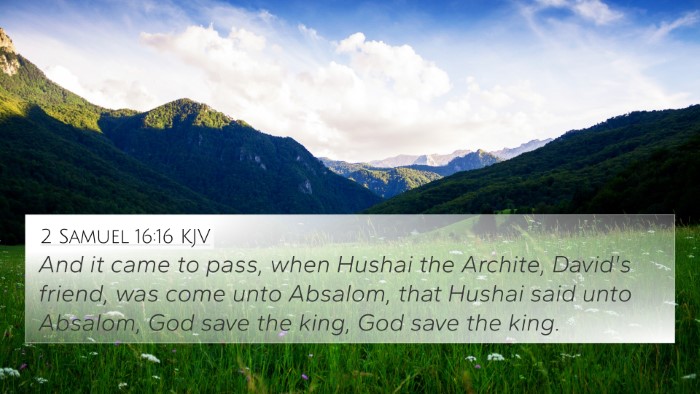Understanding 1 Samuel 28:2
Verse: "And David said to Achish, 'If you will give me a place in one of your country towns that I may dwell there.' And Achish said to David, 'Very well, I will make you a ruler over your own town.'"
This verse encapsulates a pivotal moment in David's life, illustrating themes of diplomacy, survival, and complex relationships during his time of exile. Achish, the Philistine king of Gath, offers refuge to David during his fugitive years, showcasing the irony of David, an Israelite, seeking safety in enemy territory.
Commentary Summary
-
Matthew Henry:
Henry emphasizes David's desperate circumstances, forced to align with his enemies for survival. Despite his loyalty to Israel, David’s choice signifies the depth of his trials. His request for a dwelling signifies a quest for peace amidst chaos.
-
Albert Barnes:
Barnes highlights the significance of David's relationship with Achish, pointing out that despite being an Israelite, David's reputation for bravery allows him to find refuge among the Philistines. This alliance epitomizes the sometimes complex and contradictory nature of political relationships in biblical history.
-
Adam Clarke:
Clarke explores the notion of David's leadership qualities, noting that Achish acknowledges David’s charisma and capabilities. This exchange reveals the undermining of David's position as a future king of Israel, suggesting a deeper theological complexity regarding God’s plan through imperfect means.
Thematic Connections and Cross-References
This verse connects to various other passages that illuminate the themes of exile, leadership, and the interplay between faith and human alliances. Here are key cross-references:
- 1 Samuel 27:1-2: David's decision to escape to the Philistines due to fear of Saul, foreshadowing his reliance on foreign powers.
- Psalms 56:1-4: David’s prayers during his exile show his reliance on God amidst danger from his enemies.
- 1 Samuel 30:1-6: David's subsequent battles while in Philistine territory, highlighting his complex duality as both refugee and warrior.
- 2 Samuel 1:1: Reflects on David’s eventual return to Israel and his path toward kingship after years of strife.
- Proverbs 21:1: "The king’s heart is in the hand of the Lord, as the rivers of water: He turneth it whithersoever he will" — which connects to David’s experiences influencing foreign rulers.
- Romans 8:28: A New Testament reminder that all things work together for the good of those who love God, resonating with David’s trials leading to his ultimate purpose.
- 1 Chronicles 12:19-22: Discusses how men joined David while he was in exile, emphasizing divine orchestration in his rise to leadership.
- Hebrews 11:32-34: Alludes to the faith of David among the great figures, acknowledging that his path had divine significance despite its tumultuous nature.
- Jeremiah 17:7-8: Parallels faith in God and trusting his providence, echoing through David’s life journey.
- Matthew 5:10: Blessed are those persecuted for righteousness, foreshadowing David’s plight as he stood for God amidst adversity.
Applications and Reflections
In examining the depths of 1 Samuel 28:2, we find practical implications for modern believers:
- Trust in God: Amidst our struggles, as David sought refuge, we too must rely on God’s guidance.
- Navigating Relationships: Just as David managed his alliances, we must wisely cultivate relationships that honor our values.
- Finding Peace in Chaos: Encouragement to seek God’s peace and understanding during turbulent times mirrors David’s desire for safety.
- God's Sovereignty: This narrative shows how God can work through unexpected alliances, reminding us to trust His overarching plan.
Conclusion
1 Samuel 28:2 serves as an illustrative narrative of David's trials and divine purpose. By cross-referencing Bible verses, we see not only the historical context but also the profound theological implications that resonate throughout Scripture. Understanding these connections enhances our study of the Bible and deepens our faith.





